Ivan Marovic, one of the leaders of the protest movement in Serbia that toppled Yugoslavian strongman Slobodan Milošević in 2000, has told IranWire that he is optimistic about the prospect of democratic change in Iran in light of this month's protests.
In an interview with IranWire’s founder Maziar Bahari, Marovic said he had been following political developments in the country – and successive waves of popular protests like those ongoing in Iran at the moment since the 2009 Green Movement.
“We are all really inspired by what we see in Iran,” he said, “and the courage, determination and persistence is something we can all learn from.
“It’s a difficult struggle. Most movements take a very long time to create meaningful change, especially in entrenched regimes which are not willing to listen. So in a sense, that persistence needs to be even greater.”
Marovic was a student organizer and one of the leaders of Otpor, a nonviolent resistance group in Serbia. Otpor began life as a civil protest movement in 1998 and went on to garner some 70,000 members.
Otpor’s tactics including organizing mass demonstrations against dictatorial rule in Serbia, blockades, occupying government buildings, media activities, and other public expressions of dissent.
The group published a “Declaration on the Future of Serbia” and went on to agitate for a free and fair election overseen by international bodies that eventually pushed Milošević out of office.
Marovic told IranWire that he remained convinced a peaceful mass mobilization was the best way to ensure success in bringing about change.
“When we go into a conflict with a dictator,” he said, “they’re much better-equipped, better-skilled, and don’t have any scruples at all. So it doesn’t matter if we’re violent or nonviolent.”
At the same time, he said, “If you look at the overall trend, it shows that nonviolent movements have been twice as successful as violent movements, at least in the 20th and the early 21st centuries.”
Marovic said that instead of trying to fight the regime on its own violent terms, Iranian civilians should focus on making the movement bigger and ensuring superior numbers. The more people physically present in the street, the harder it will be for agents of the regime to break them or their resolve.
Simultaneously, he told IranWire, there were other avenues citizens could use to disable the current regime, such as strikes, boycotts, non-cooperation with the government and refusal to pay taxes. Some of these have already been observed happening in Iran in the past week.
"When we go to the street, they can beat us and arrest us,” he said. “But when we as citizens stop fulfilling our duties and obligations, the regime has many difficulties to deal with."
In addition to this, Marovic said, Iranians could lay the groundwork for a future transition by bolstering civil society and starting to create new institutions that could one day take the place of government.
"For instance, neighborhood committees," he said. "There are cases in different countries where they were going so far as [to create] parallel schools, parallel media, parallel institutions. Then, it didn't really matter what the regime was trying to do, because people started building up their own power. That made it difficult even for crackdowns or any kind of mass arrest to stop that shifting of the power balance."
Marovic added that in Iran and elsewhere in the world today, he finally saw cause for optimism after a 10- to 15-year trend of decline of civic freedoms in many countries. “There been things happening around the world lately,” he said, “especially this year. We have reached a point where the tide is turning.
“We can see with Ukraine how badly it’s going for Putin. We are seeing people in China demanding that they don’t pay mortgages for apartments that were never built for them, where the money was just stolen by the regime. And we see it in Iran with these protests. I am very, very optimistic that the resurgence of authoritarianism we have seen is about to end.”
Below is the full transcript of Maziar Bahari's interview with Ivan Marovic on Friday, September 25.
Many Iranians say that nonviolent movements can be successful in countries with a bit of space, like Ukraine, Georgia, or even in Tunisia. But when it comes to brutal dictatorships like Saddam Hussein's Iraq, or Assad's Syria, or the Islamic Republic, you have to go for “an eye for an eye”; resistance is not effective. What would you tell them?
Coming from Serbia, and not just Serbia, but the whole region of the Balkans, that experienced so many wars and conflicts, I approach the question of violence versus nonviolence from a position of what’s possible when we look at these brutal dictators.
I used to live in the dictatorship of Slobodan Milošević, which didn’t just cause harm to our people but was responsible for war crimes in Bosnia and Kosovo. They really were capable of mass murder, of atrocities.
The question is, when we go into a conflict with such a dictator, if we choose something as a method of struggle – let's say violence – they are much better-equipped, much better-skilled, and much better-motivated. And they don't have any scruples at all. This was shown many times.
So, within the question of violence versus nonviolence is the question of like what is it that we as the civilian population are capable of doing, rather than what would we like to do, or what do we think would be most appropriate. Just looking at it from our perspective.
But even if we look at the historical record, we can see that nonviolent movements have proved to be twice as effective then violent movements. And yes if you use the example of Saddam Hussein's Iraq, that was toppled through a foreign invasion. We can find examples to support each claim. But if you look at the overall trend, it shows nonviolent movements were twice as successful, at least when we look at the 20th and the early 21st centuries.
So when the police beat protesters, when the police shoot at people, when the police murder people, arrest them and torture them, what do you tell those protesters? Do you tell them that remain nonviolent? How should they resist nonviolently to such brutality?
That's a great question. As you already pointed out, they are going to use violence, they are going to use such measures, regardless of what we do. So it doesn't matter whether we are going to be violent or nonviolent. The regime that is kind of ready to use this kind of excessive force, not just violence, but torture and human rights violations of different kinds, is going to do it.
So when we choose our tactics and when we decide which method to use, our main question should be, what methods are going to increase the participation of the people? IF we want to win against an adversary that is organized, well-funded, skilled, that uses violence and has the weapons necessary for that, the only thing that we have on our side is numbers: the population of people who are on our side.
I wouldn't call it nonviolent action. It's a mass, broad-based mobilization of the people. Thousands and thousands, tens of thousands, hundreds of thousands of people that by definition will be unarmed because the civilian population don’t have the arms, they don’t have the military training, they don’t have the military organization.
Whenever there is a crackdown, whenever there is a mass arrest – and I've been arrested myself personally many times – the question is not what the police are going to do or what the regime is going to do, but what can we do to increase the number of people who are participating.
Because that’s the only way we can fight back against torturers, against murderers and against criminals. That is the only argument that they will accept, if they see a lot of people on the other side, if they see that they're in the minority. This is when they're going to start to scrap.
So I guess you're talking about legitimacy. Because even the most rigid dictatorships and authoritarian regimes, like the Nazis or the one in North Korea or Stalin, are seeking legitimacy and pretend to be legitimate. And I guess what you're saying is that mass nonviolent protests against these regimes take that legitimacy away from them.
Yes, indeed. But that's only the first step. When I said mass mobilization, I deliberately avoided the words “mass protest”, because protest is, in most cases, just the first step.
People go into the street to protest because they think that they should be heard and their grievances should be voiced. And they want to make sure that that they're noticed, that people take note of what is going on.
But usually the regime doesn't care. They’re not listening to the complaints. They’re not listening to protests. They’re not listening to demands. And they may even decide to do a crackdown. So successful movements move very quickly from protest to non-cooperation.
Rather than just going into the streets to protest, which is very, very risky and dangerous, people move to different forms of non-cooperation: boycotts, strikes, denying the kind of classic consent that citizens usually give.
People stop paying taxes. They stop supplying the regime with resources. And this is very difficult for the regime to counter. If you or I go into the streets, they can punish me, arrest me, whatever. But if I stop performing my duties as a citizen, it's very difficult for them to make me do that.
For instance, in our case in Serbia, the things we did were that we were organizing strikes slowly in different professions, culminating with the general strike where even the miners reduced the production of coal. That meant that Serbia had only four or five days’ worth of electricity.
In that sense it doesn't matter what the regime wants or what the regime is trying to do. When people are refusing to work, it's difficult to maintain the operation of the country. So what they did then was send in the military to take over the mines, and citizens organized to protect the miners. But the military can’t operate the mines; they need people to know how to do it. So that’s another problem.
And then there is the third step, which is actually the most important part of building power for movements, and this is when people start building their own parallel institutions. There are, for instance, neighborhood committees. There are cases in different countries where they’ve gone so far as to have parallel schools, parallel media, parallel institutions. Actually then it didn't really matter what the regime was trying to do, because people started building their own power. And that made it difficult even for the crackdowns or any kind of mass arrest or anything to stop that shifting of the power balance.
So in a sense, I guess what you're also warning people in terms of protest and mobilization is to be aware of agitators who may want to make the protest violent in order for the government and the regime to take advantage. That is something that we’ve seen in Iran repeatedly in the past two decades. Have you come across such examples in Serbia and other countries?
Yes, actually in Serbia, one of the most damaging elements of the movement were those that had a very radical, self-defeating strategy.
At one point we actually managed to mobilize people who were not really seen as members of the movement: people who were retired, elderly, started joining. I think it happened because we were students, younger, and there was a natural connection between us and our grandparents. So we started doing a lot of joint action with the retired people’s organizations.
They were suffering in their retirement. Their pensions were very low. It was very difficult. And then people would go in and give speeches in which they were demanding very radical, violent action, and all the retired people would run away and go home. We understood that the reason these speeches were given was actually to undermine our effort to bring in the elderly people.
So what are the tenets of nonviolent resistance? If you want to list them.
The first is that in English, they call it nonviolent resistance. In my language we would call it unarmed resistance.
The reason we call it unarmed is that it’s the term for a civilian population that doesn't have what those violent thugs associated with the regime have: not just firearms, but the majority of the population, the elderly, women, young adults, didn’t do military training. They’re not part of a street gang. They’re just ordinary citizens. They’re not equipped to use violence.
There is only a very small percentage of the population that actually uses political violence and benefits from it. These are the ones who would like political violence to be dominant, because then they can rule.
So the first tenet of nonviolent resistance, civil resistance, is that it is about people power. It is about numbers. It is about the majority of the population. And the method needs to match the capabilities of those people. Because if we have those people on our side through non-cooperation, we will deny any regime the ability to rule.
So in terms of non-cooperation, do you regard sabotage as non-cooperation as well?
That depends, to tell you the truth. For instance, we've seen that the simple blockade of a bridge can backfire on protesters if they don't let an ambulance go through. So when we do that, we need to make sure that we respect people who are in dire need. It really depends what kind of sabotage, and if it’s hurting the civilian population.
They have to have the public interests in mind. You're not stopping ambulances. You’re not destroying public property that can be used for people. But I’ll give you an example of a sabotage that actually worked really well, also from Serbia.
The regime was trying to build the small hydroelectric plants where they would put a whole river into a pipe, then divert that pipe into a hydroelectric plant that would be used by some regime-connected businessmen. So people would go there and they would destroy that pipe, and then they would let the river come through.
Everybody agreed that was an appropriate one. The same goes for any other property destruction. Property destruction in general is seen as problematic, but it really depends on the circumstances. What we need to have in mind is that what we are doing as the movement needs to be in the service of the population, in the service of general society, and in the service of shifting the power balance.
When we look at these tactics, let's say sabotage or property destruction or even violence, they don’t usually shift the power balance. What shifts it is actually going back to the first step and increasing the numbers.
Many of our audience members have been asking us to provide them with information about nonviolent resistance, especially union activists, teachers and some students who believe violence and the destruction of property can be counterproductive.
I think you've answered many of those questions beautifully. I will ask you my last question, but I'd like to ask the audience members to have to send us more questions and then maybe we can cover those in another session, if you don't mind.
My last question is that you've been following the events in Iran in the past few days, and in fact you've been following the events in Iran since the 2009 Green Movement. I know you've been in touch with some activists. What are your recommendations? What is your advice to your Iranian friends and inside the country?
We are all inspired by what we see in Iran, and the courage, determination and persistence is something we can all learn from. It's a difficult struggle. Most movements take a very long time to create a meaningful change, especially in entrenched regimes which are not willing to listen. So in a sense, the persistence needs to be even greater.
There are things happening around the world lately, especially this year. Finally [after] that decline of democratic trends, the resurgence of dictatorship, that things are worse than they were 10 or 15 years ago, we have reached the point where the tide is turning. We can see with what is happening in Ukraine, and the Russian war, how it's going badly for Putin. We’re seeing it in China, with the people demanding they don't pay the mortgages for apartments that were never built for them, where the money was just stolen by the regime. And we can see it in Iran with these protests. There is something happening in the world. And I am very, very optimistic that the tide is turning, and that resurgence of authoritarianism we’ve seen is about to end.
Do you have any specific advice for Iranians based on your observations in the past few days?
What I can say, and this is also from the experience I have from Serbia, is that finding ways to peel off the different pillars of support, different organizations and institutions that are propping up the regime, through non-cooperation, is the best way to solidify the movement and create the power shift.
I am looking forward to seeing how this noncooperation may play out in Iran, through different tactics like boycotts and strikes and other forms of civil disobedience. But I am really inspired by what I see, and the courage and determination, especially of the women.
visit the accountability section
In this section of Iran Wire, you can contact the officials and launch your campaign for various problems





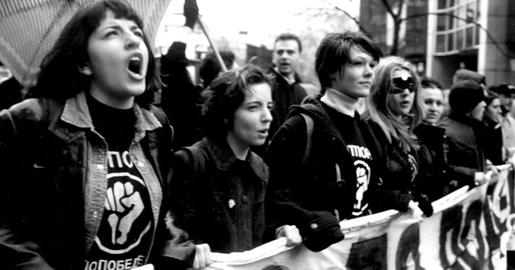
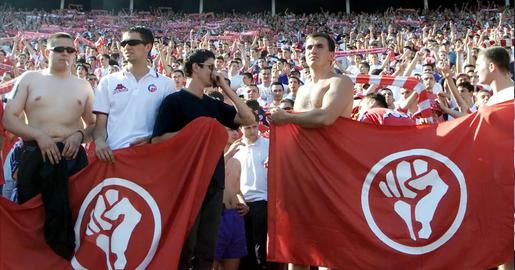
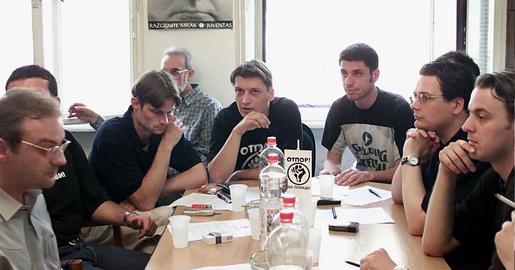





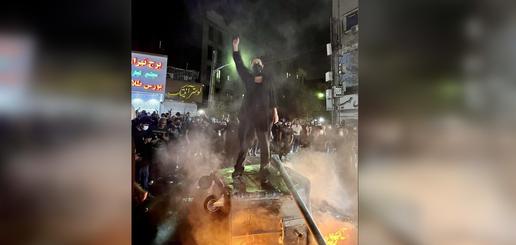
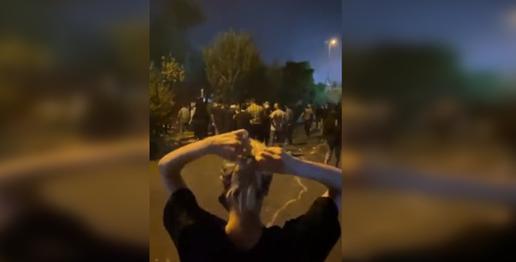

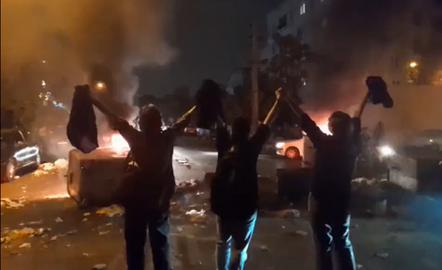










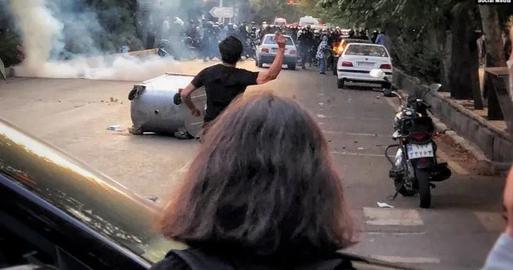
comments